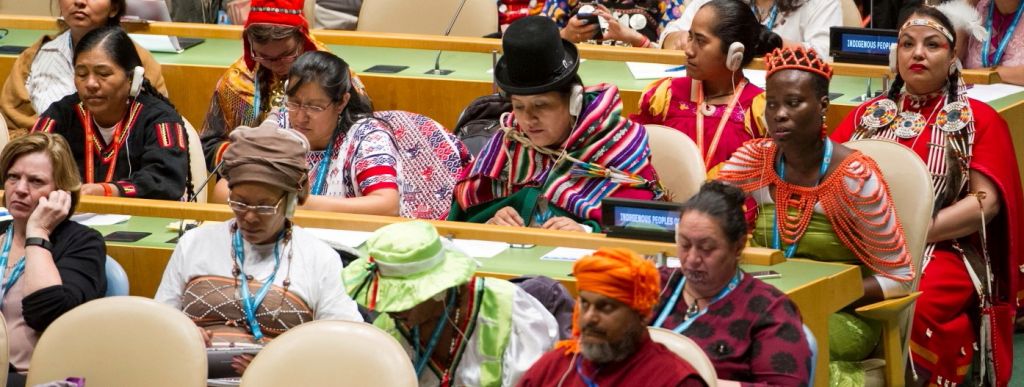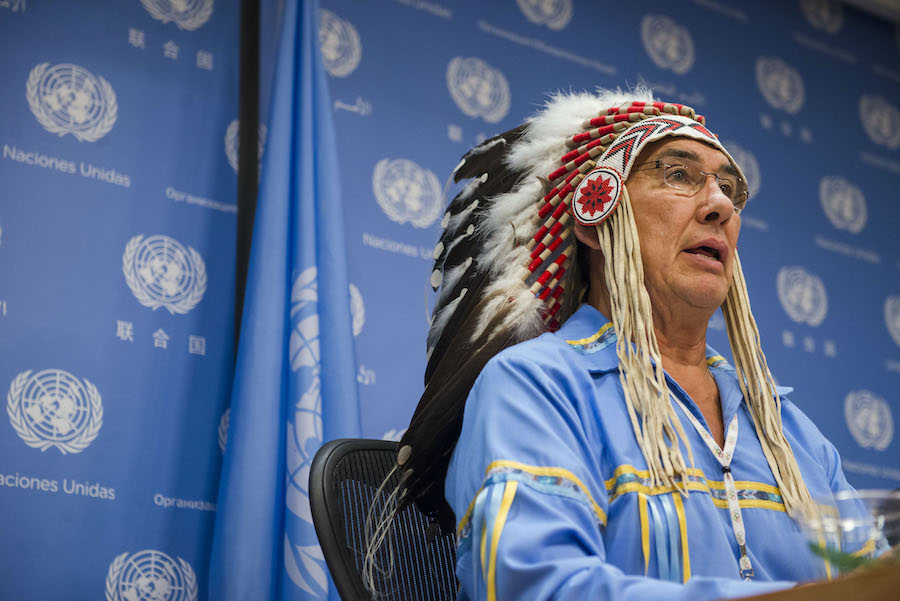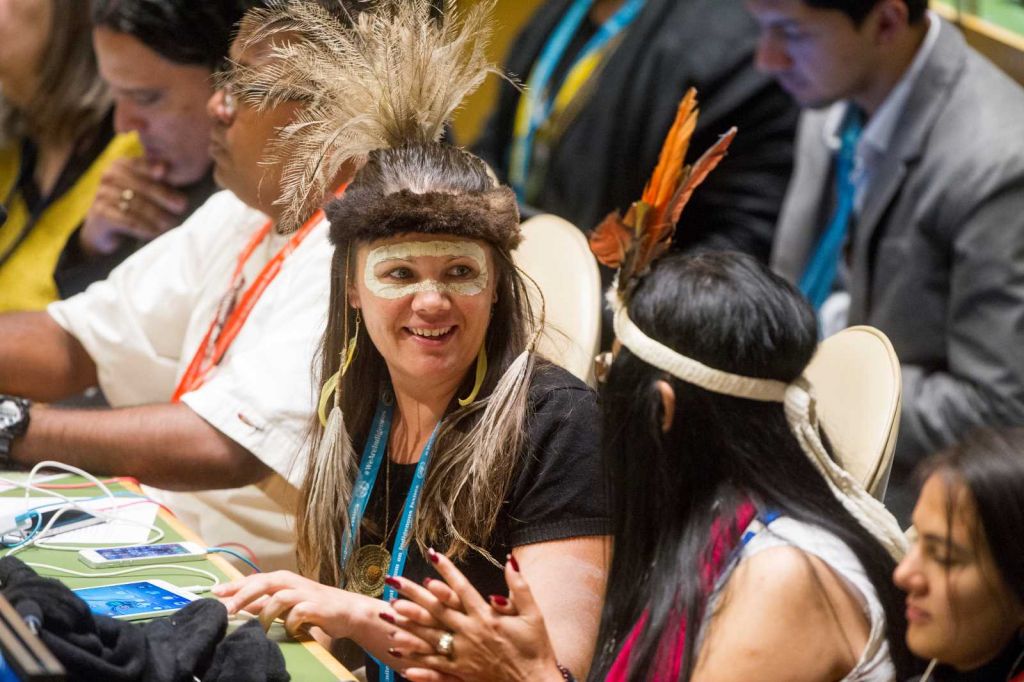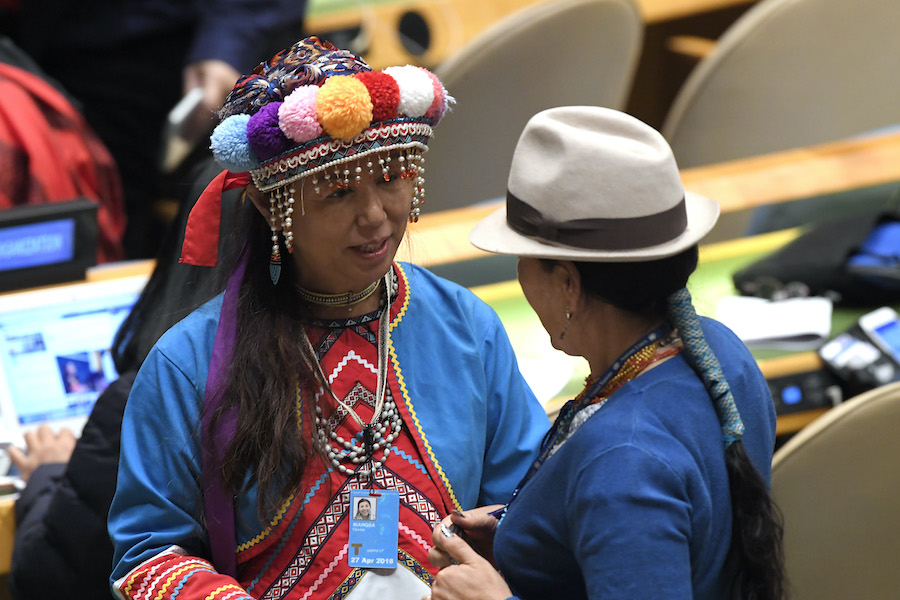
What is the Permanent Forum?
The United Nations Permanent Forum on Indigenous Issues (UNPFII) is the only global space for dialogue and setting forward proposals on indigenous issues. It is possible to show the situation of indigenous peoples, express our demands and carry out negotiations among indigenous peoples organizations, governments and United Nations bodies.
It is also a space that helps to contextualize processes, such as the 2030 Agenda on Sustainable Development, with an indigenous perspective.
This is a mechanism won by the indigenous peoples movement.
The Permanent Forum is an advisory body of the United Nations Economic and Social Council (ECOSOC) and was established in 2000 with the mandate of examining indigenous issues in economic and social development, culture, environment, education, health and human rights.
For the indigenous movement, the Permanent Forum is a keyspace to inform, raise awareness and advocate before government authorities and intergovernmental organizations, drawing attention to good practices progress, and setbacks regarding the rights of indigenous peoples, women, children and youth.

The Economic and Social Council is one of the six main organs of the United Nations and it seeks to advance the three dimensions of sustainable development (economic, social and environmental). This organ is a crucial platform to foster discussions and innovative thinking, forging consensus on the way forward and coordinating efforts towards the achievement of internationally-convened goals. Also, it is responsible for the follow-up to major conferences and summits of the United Nations.
What does the Permanent Forum do?
- It gives advice and issues recommendations to ECOSOC, the United Nations programmes, funds and agencies and the Member States.
- It promotes the integration and coordination of activities related to indigenous peoples within the United Nations system.
- It prepares and disseminates information on indigenous issues.
- It fosters implementation of the United Nations Declaration of Indigenous Peoples (UNDRIP article 42).

What are the issues addressed by the Permanent Forum?
The Forum’s six mandated areas are:
Besides, the Permanent Forum examines a series of cross-cutting issues for indigenous peoples, including gender and indigenous women, children and youth, the 2030 Agenda on Sustainable Development, data disaggregation and indicators, indigenous peoples with a disability, among others.
Each Forum session gives priority to a theme that is especially important to indigenous peoples.
Permanent Forum Members
The Permanent Forum consists of 16 members who serve ad honorem and on an individual basis as independent experts. Their mandate lasts three years and they can be reelected for an additional period. 8 of them are nominated by governments and 8 by indigenous peoples organizations of their regions.
The members nominated by the governments are elected by ECOSOC based on the 5 regional groups typically used by the United Nations: Africa, Asia, Eastern Europe, Latin America and the Caribbean, Western Europe and others. On the other hand, the members nominated by indigenous organizations are elected by the president of ECOSOC and represent seven socio-cultural regions established to give wide representation to the world’s indigenous peoples. The regions are Africa; Asia; Central and South America and the Caribbean; the Arctic; Central and Eastern Europe, Russian Federation, Central Asia and Transcaucasia; North America; and the Pacific.

Session’s Programme of Work
The sessions’ programme of work often include:
- Debate on the special theme.
- Follow-up on the Forum recommendations.
- Implementation of the six mandated areas.
- Dialogue with the Special Rapporteur and the Expert Mechanism.
- 2030 Agenda on Sustainable Development.
- Follow-up on the Outcome Document of the World Conference on Indigenous Peoples.
In its 17th Session, the Permanent Forum incorporated regional dialogues in the agenda including the participation of representatives from States and indigenous organizations. Besides, the special theme “The collective rights of indigenous peoples on land, territory and resources” became a recurrent theme in future sessions.
Apart from the open sessions, the members of the Forum discuss in closed sessions with Member States, and United Nations funds, programmes and organs. Parallel to the official sessions, there are side events where the debate on specific topics is deepened.
During the sessions, the expert members of the Permanent Forum gather information on the situation of indigenous peoples, identifying good practices and challenges and elaborate proposals that are included in the final report.
Who can participate in the Permanent Forum?
The Permanent Forum sessions gather more than 1000 participants, including representatives from indigenous organizations, Member States, United Nations bodies, non-governmental organizations with consultative status to the Economic and Social Council (ECOSOC), academic institutions, among others.
How can we participate in the Permanent Forum?
The participation in Permanent Forum sessions is open to indigenous peoples organizations, NGOs with consultative status and academic institutions. Every participant needs to pre-register for the sessions. The online pre-registration begins in January or February on the website and it ends from 2 to 4 weeks before the start of each session.
The indigenous peoples’ representatives freely participate in each session representing their organizations, incorporating a national delegation or in partnership with an NGO with consultative status to ECOSOC.
The representatives and institutions accredited to the session can make oral statements, depending on time availability. Priority is given to the declarations that are presented on behalf of larger coalitions. Typically 3 minutes are allocated for each oral statement in plenary.
Methods to participate in the context of the Permanent Forum:
- Presenting oral statements during the sessions in any of the official languages of the United Nations.
- Organizing and participating in side events.
- Disseminating information on the session’s programme of work.
- Disseminating the Permanent Forum recommendations at the national and local levels, and following up on their implementation in the inter-sessional period.
You can follow the official sessions via UN Web TV.
Recommendations for an effective participation
- Participating in partnership with other actors.
- Learning about past recommendations.
- Learning about the session’s special themes.
- Learning about the work of the United Nations agencies.
- Presenting consensus proposals with other commitments, instruments and processes.
UN Voluntary Fund for Indigenous Populations
The United Nations Voluntary Fund for Indigenous Peoples gives funding for indigenous peoples representatives to participate in the Permanent Forum sessions. Usually, the deadline for applications ends several months before the session.
DOCIP
We invite you to learn more about the Indigenous peoples’ centre for documentation, reseach and information, Docip. Here, you can find thousands of documents about the participation of indigenous peoples in the Permanent Forum and other United Nations mechanisms.

